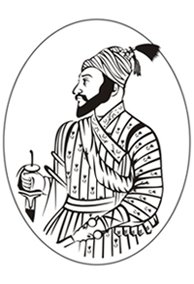Did Shivaji aim at founding a Hindu empire? He might have entertained such a desire. But one thing is certain. He did not believe that Aurangzeb or the Muslim rulers of the Deccan kingdoms had a superior claim to rule in India than him or any other Hindu, nor he considered them better qualified in managing the state. He demonstrated in his short but remarkable career that he was far superior to them all not only in war but also as an administrator, and as a far-sighted statesman who knew that administrative policies should be in line with the liberal traditions of India, and not those seeking inspiration or guidance from the principles and precepts of an alien creed. Thus he made no distinction between his subjects on the basis of caste or religion and provided freedom and equality of opportunity to all.
It is also a fact that his base was certainly broad enough to sustain any expansion of his kingdom, especially after acquisition of Bangalore, Vellore, Jinji and large areas of Bijapuri Karnatak.
As early as 1645, he had used the term Hindavi-Swarajya for his "national scheme" in one of his letters, by which he seems to have meant the rule of the Hindus in their own country, which alone was to ensure restoration of Hinduism to its former glory attained before the establishment of rule of the foreigners – the Arabs, the Turks and the Mughals – who treated the Hindus as inferior to them, and behaved towards them with abhorring arrogance, breaking their temples, insulting the idols, destroying priceless sculptures of India in observance of religious directives which to Hindus appeared to have born out of ignorance. When Shambhaji refers to him as Haindavadharma-uddharaka (the regenerator of the Hindu religion), he knew that Shivaji could do it only by acquiring political power; and that Hindavi-swarajya alone could ensure honourable position for Hinduism and the Hindus.
Shivaji filled the Hindus with a new hope and confidence. The administrative and defence arrangements made by him in his kingdom, his efforts to build a powerful Maratha fleet backed by construction of sea-forts, docks etc., the "comprehensive and manysided arrangements of Shivaji's Coronation Ceremony", and adoption of the title of Chhatrapati, compilation of a Sanskrit Dictionary giving new and appropriate administrative terms, his attempt to understand the geography with the help of specially prepared charts, as Abbe Carre reports, and his political ideals which, to quote J.N. Sarkar, "were such that we might accept them even today", and his numerous administrative measures and institutions based on sound principles of universal toleration and equal opportunities for all, all these point to his aim to re-establish Hindu paramountcy, if not in his life time, after him. But his eventful life full of promise was cut short at the age of 53 only.
It is also a fact that his base was certainly broad enough to sustain any expansion of his kingdom, especially after acquisition of Bangalore, Vellore, Jinji and large areas of Bijapuri Karnatak.
As early as 1645, he had used the term Hindavi-Swarajya for his "national scheme" in one of his letters, by which he seems to have meant the rule of the Hindus in their own country, which alone was to ensure restoration of Hinduism to its former glory attained before the establishment of rule of the foreigners – the Arabs, the Turks and the Mughals – who treated the Hindus as inferior to them, and behaved towards them with abhorring arrogance, breaking their temples, insulting the idols, destroying priceless sculptures of India in observance of religious directives which to Hindus appeared to have born out of ignorance. When Shambhaji refers to him as Haindavadharma-uddharaka (the regenerator of the Hindu religion), he knew that Shivaji could do it only by acquiring political power; and that Hindavi-swarajya alone could ensure honourable position for Hinduism and the Hindus.
Shivaji filled the Hindus with a new hope and confidence. The administrative and defence arrangements made by him in his kingdom, his efforts to build a powerful Maratha fleet backed by construction of sea-forts, docks etc., the "comprehensive and manysided arrangements of Shivaji's Coronation Ceremony", and adoption of the title of Chhatrapati, compilation of a Sanskrit Dictionary giving new and appropriate administrative terms, his attempt to understand the geography with the help of specially prepared charts, as Abbe Carre reports, and his political ideals which, to quote J.N. Sarkar, "were such that we might accept them even today", and his numerous administrative measures and institutions based on sound principles of universal toleration and equal opportunities for all, all these point to his aim to re-establish Hindu paramountcy, if not in his life time, after him. But his eventful life full of promise was cut short at the age of 53 only.

